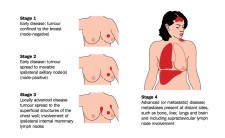
Stages of Breast Cancer via Shutterstock
A study published by JAMA Surgery says that survival rates for women with advanced breast cancer, also known as Stage IV, has improved. In particular, researchers found a significant link between those who received initial treatment with surgery, and improved survival rates.
Stage IV breast cancer represents the spread beyond the breast and lymph nodes to other regions of the body. Common sites of metastasis include bone, liver and lung.
With the exception of skin cancers, breast cancer is the most prevalent cancer among American women, and the second leading cause of death. Approximately one in eight women in the United States will develop invasive breast cancer during the course of her life. It's estimated there will be nearly 232,000 new cases of invasive breast cancer this year, with the death toll exceeding 40,000, according to statistics from the American Cancer Society.
Despite these daunting figures, trends have shown incidence rates of breast cancer to be stable among white women, but increasing slightly within the African American population. Death rates of other cancers have also been on the decline. These trends are attributed to greater awareness, increased screening and improved treatment options.
Researchers at the University of Iowa analyzed data of 21,372 U.S. women with Stage IV breast cancer to evaluate the differences in survival, particularly survival of at least 10 years from the initial surgery from the primary tumor. They found the median survival for these patients increased to 26 months (2007-2011), up from 20 months (1988-1991). Surgical intervention was noted to be associated with improved survival. Clinical factors that correlated with prolonged survival included surgery, tumor size, hormone receptor status, marital status and year of diagnosis.
Stage IV breast cancer presents a problem to most surgeons, mainly because there is no unanimity about standard of care for these patients. The one thing that most experts agree is that Stage IV largely represents an incurable diagnosis. Most cases of advanced breast cancer will receive some form of systemic therapy (hormonal therapy, chemotherapy, targeted therapies), while local therapies (radiation therapy or surgery) are reserved for specific situations. For these patients the focus shifts to palliative care versus curative.


